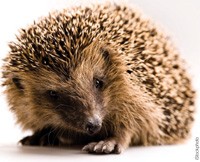Play all audios:
Access through your institution Buy or subscribe > We are still limited by a lack of knowledge about the detailed > molecular mechanisms driving pancreatic cancer development and >
maintenance. Rune Toftgård Patients with the most common form of pancreatic cancer, ductal adenocarcinoma, barely respond to therapy. A study in mice now opens the door to a new approach.
Olive _et al_.1 took aim at the tough layer of fibroblasts that encase such tumors and limit their accessibility to drugs. This inhibitor, in combination with a more conventional drug
(gemcitabine), allowed blood vessels to penetrate such tumors and shrank them in a mouse model. The lives of the mice were extended only by a few weeks, but the approach opens the door to
new ways of treating this difficult cancer. This is a preview of subscription content, access via your institution ACCESS OPTIONS Access through your institution Subscribe to this journal
Receive 12 print issues and online access $209.00 per year only $17.42 per issue Learn more Buy this article * Purchase on SpringerLink * Instant access to full article PDF Buy now Prices
may be subject to local taxes which are calculated during checkout ADDITIONAL ACCESS OPTIONS: * Log in * Learn about institutional subscriptions * Read our FAQs * Contact customer support
REFERENCES * Olive, K.P. et al. _Science_ 324, 1457–1461 (2009). Article CAS Google Scholar * Bailey, J.M. et al. _Clin. Cancer Res._ 14, 5995 (2008). Article CAS Google Scholar *
Bailey, J.M. et al. _Oncogene_ (in the press). Download references RIGHTS AND PERMISSIONS Reprints and permissions ABOUT THIS ARTICLE CITE THIS ARTICLE Hedgehog inhibitor pokes tumor. _Nat
Med_ 15, 734 (2009). https://doi.org/10.1038/nm0709-734 Download citation * Issue Date: July 2009 * DOI: https://doi.org/10.1038/nm0709-734 SHARE THIS ARTICLE Anyone you share the following
link with will be able to read this content: Get shareable link Sorry, a shareable link is not currently available for this article. Copy to clipboard Provided by the Springer Nature
SharedIt content-sharing initiative

